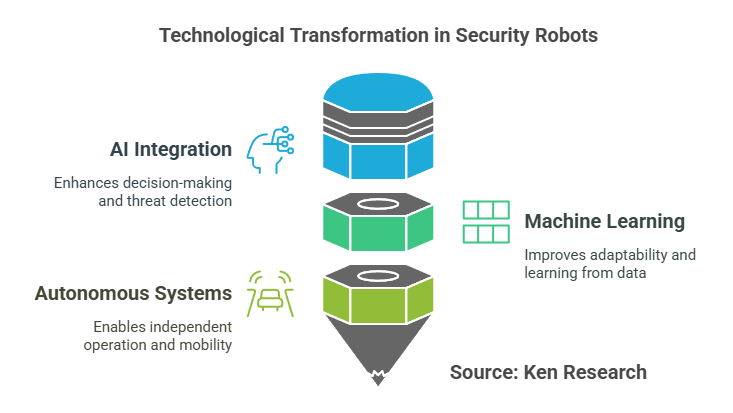Ambient Intelligence: Elevating Everyday Life with Smart Innovation!

Strong 8k brings an ultra-HD IPTV experience to your living room and your pocket.
Introduction to the Ambient Intelligence Market
As technology continues to evolve at an unprecedented pace, we find ourselves at the threshold of a new era one defined by the Ambient Intelligence Market (AmI). This emerging paradigm seeks to create intelligent environments that respond to the needs of users seamlessly and intuitively. The Ambient Intelligence market has been rapidly gaining traction, and its impact is expected to be profound across various sectors, including healthcare, retail, and residential living. This blog will delve into the current state of the Ambient Intelligence market, examining key statistics, projected growth, major players, and applications, while also offering insights into its transformative potential.
The impact of Ambient Intelligence extends far beyond individual households and offices. In healthcare, for example, the ability to monitor patients remotely not only improves the quality of care but can also significantly reduce healthcare costs. Smart hospitals can optimize resource allocation, enhance patient safety, and provide data-driven insights for improved clinical outcomes. Similarly, in retail, the integration of Ambient Intelligence can create hyper-personalized shopping experiences that not only cater to consumer preferences but also help businesses manage inventory and logistics more efficiently.
Understanding Ambient Intelligence
Ambient Intelligence refers to electronic environments that are sensitive and responsive to the presence of people. It integrates advanced technologies such as artificial intelligence, machine learning, and the Internet of Things (IoT) to create spaces that can learn from user behavior and adapt accordingly. Imagine a home that adjusts the lighting based on your mood or a healthcare facility that monitors patients' health autonomously this is the promise of Ambient Intelligence.
Market Size and Growth Projections of Ambient Intelligence market
According to recent market analyses, the Ambient Intelligence market was valued at $73.72 billion in 2022 and is projected to reach $87.13 billion in 2023. By 2030, this figure is expected to soar to $237.47 billion, representing a CAGR (Compound Annual Growth Rate) of 15.40% from 2023 to 2030.
This rapid growth underscores the increasing demand for smart solutions across various industries as businesses and consumers alike recognize the benefits of automation and intelligent environments.
The Ambient Intelligence market can be segmented based on type and application:
1. Type of Ambient Intelligence market :
- Hardware: This includes sensors, devices, and other physical components that make up intelligent environments.
- Software and Solutions: This segment encompasses the applications, analytics, and services that enable the functionality of these intelligent systems.
2. Applications of the Ambient Intelligence market :
- Residential: Smart homes equipped with intelligent systems for energy management, security, and comfort.
- Retail: Enhancing customer experiences through personalized marketing and improved inventory management.
- Healthcare: Remote patient monitoring and smart hospital environments that improve care delivery.
- Industrial: Smart factories leveraging IoT and automation for operational efficiency.
- Office Buildings: Intelligent workplace environments that boost productivity and employee satisfaction.
- Automotive: Advanced driver-assistance systems (ADAS) and connected vehicles that enhance safety and convenience.
- Others: This may include educational institutions, smart cities, and various other sectors.
The Ambient Intelligence market is witnessing significant growth across various regions, including:
- North America: Leading the charge due to early adoption of smart technologies and robust investment in research and development.
- Europe: Following closely with a strong emphasis on sustainability and innovation in urban living.
- Asia Pacific: A rapidly growing market driven by technological advancements and increasing urbanization.
- Latin America: Gradually embracing smart solutions, especially in urban centers.
- Middle East & Africa: Emerging as a market with potential, particularly in sectors like healthcare and retail.
Several companies are at the forefront of the Ambient Intelligence market, including:
- Schneider Electric: Specializing in energy management and automation solutions.
- Ingersoll-Rand: Known for its innovative building technologies.
- Legrand: A leader in electrical and digital building infrastructure.
- Siemens: A global powerhouse in automation and digitalization.
- ABB Group: Focused on robotics and industrial automation.
- Honeywell International: Providing integrated solutions for smart buildings and homes.
- Tunstall Healthcare: Specializing in telehealth and remote patient monitoring solutions.
- Philips: Innovating in healthcare and consumer lifestyle products.
- Chubb Community Care: Offering security and safety solutions.
- Caretech: Focusing on digital solutions in the healthcare sector.
- Assisted Living Technologies: Developing smart technologies for senior care.
These players are continually innovating and expanding their offerings to capture a larger share of the growing market.
The Transformative Impact of Ambient Intelligence
One of the most significant benefits of Ambient Intelligence is its potential to enhance the quality of life for users. In residential settings, smart home technologies can provide unparalleled convenience, energy savings, and security. For instance, intelligent lighting systems can adjust to the time of day or personal preferences, creating a more comfortable living environment.
In healthcare, Ambient Intelligence can revolutionize patient care. Remote monitoring systems can track vital signs and alert healthcare providers in real time, significantly improving response times and outcomes. Moreover, these systems can empower patients to manage their health better, promoting independence and reducing the need for constant supervision.
Ambient Intelligence Market Driving Business Efficiency :
In retail and industrial sectors, Ambient Intelligence can drive efficiency and productivity. Retailers can utilize smart inventory management systems to reduce waste and improve stock availability. Intelligent analytics can also help businesses understand consumer behavior, allowing for more effective marketing strategies.
In industrial settings, smart factories equipped with IoT sensors can optimize production processes and reduce downtime. By analyzing data from various sources, businesses can make informed decisions that enhance operational efficiency.
Environmental Sustainability of Ambient Intelligence Market:
Ambient Intelligence can also play a vital role in promoting sustainability. Smart energy management systems can optimize power consumption in buildings, reducing waste and lowering costs. In smart cities, integrated solutions can manage resources more effectively, contributing to a greener urban environment.
While the Ambient Intelligence Market presents numerous opportunities, it also faces several challenges:
- Privacy and Security: As smart devices collect vast amounts of personal data, ensuring user privacy and security is paramount. Companies must implement robust data protection measures to gain consumer trust.
- Integration and Interoperability: The diverse range of devices and technologies in the market can lead to compatibility issues. Developing standardized protocols and ensuring seamless integration between systems will be critical for widespread adoption.
- High Initial Costs: Although the long-term benefits are substantial, the initial investment required for smart technologies can be a barrier for many consumers and businesses.
- Technological Literacy: For some users, especially the elderly, the complexity of new technologies can be daunting. Providing user-friendly interfaces and adequate training will be essential for successful implementation.
The Future of Ambient Intelligence
Looking ahead, the Ambient Intelligence market is poised for significant growth. As technology continues to advance, we can expect to see even more sophisticated solutions that enhance user experiences and streamline operations across various sectors.
1. Increased Integration of AI and Machine Learning: These technologies will enable systems to learn from user behavior, becoming increasingly intuitive and responsive.
2. Expansion of Smart Home Technologies: As consumer demand for smart home solutions rises, we can expect more affordable and user-friendly products to enter the market.
3. Focus on Sustainability: With growing awareness of environmental issues, companies will prioritize sustainable practices and solutions.
4. Adoption of 5G Technology: The rollout of 5G networks will facilitate faster communication between devices, enhancing the performance of Ambient Intelligence applications.
5. Enhanced Personalization: Future systems will likely offer even greater levels of personalization, tailoring experiences to individual preferences and needs.
Concluding Ambient Intelligence market :
The Ambient Intelligence market represents a fascinating intersection of technology and human experience. With its projected growth trajectory, it is clear that the demand for intelligent environments will only increase in the coming years. By harnessing the power of advanced technologies, we can look forward to a future where our homes, workplaces, and public spaces are more connected, efficient, and responsive to our needs. As we embrace this transformative trend, it is essential to address the associated challenges and ensure that the development of Ambient Intelligence benefits everyone. The journey towards a smarter, more integrated world is just beginning, and the possibilities are limitless.
The Ambient Intelligence market stands at a pivotal juncture, representing not just a technological shift but a fundamental transformation in how we interact with our environments. As we move further into the 21st century, the integration of intelligent systems into everyday life promises to enhance our quality of living, streamline business operations, and promote sustainability in unprecedented ways.
Note: IndiBlogHub features both user-submitted and editorial content. We do not verify third-party contributions. Read our Disclaimer and Privacy Policyfor details.







